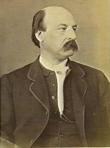Comic Opera (in three acts).
Fayette is said to be loosely based on incidents that occurred during the Victorian gold rush era. Its story tells of a digger who goes to Melbourne to celebrate striking it lucky and while there invites a variety troupe to return with him to the goldfields. 'The only return that he asks the troupe for their passage to the diggings is that they shall keep him amused on the way'. At the close of one of their little plays, which they call 'Bush Revels,' the company spot a dazed and aimless traveler coming towards them and decide to play a trick on him. They leave their camp with all sorts of good things (including champagne) in plain sight and conceal themselves in the undergrowth to watch. Thinking he is hallucinating, a situation made worse by the fact that he becomes a little drunk, the traveller looks into a mirror and sees the reflection of what he thinks is an angel. The vision, which causes him to collapse, is only that of one of the actresses who has sneaked up behind him. When he regains consciousness the traveller continues on to the diggings where he soon has an extraordinary change of luck and becomes a wealthy man. Unable to get the angel out of his mind he refuses to look at any women lest their faces distort his memory of her image. His friends rally around him and find the antidote to his misery by replaying the camp scene to him (essentially a play within a play). When he looks into the mirror once again and sees the features that have enchanted him he is cured. The play ends with word coming to him that he has struck an even richer vein of gold. By now content ('his spirit love has become a mortal fact') - he tells his mates to share the find (Table Talk 12 February 1892, pp.5-6).

 3487795011281251458.jpg
3487795011281251458.jpg